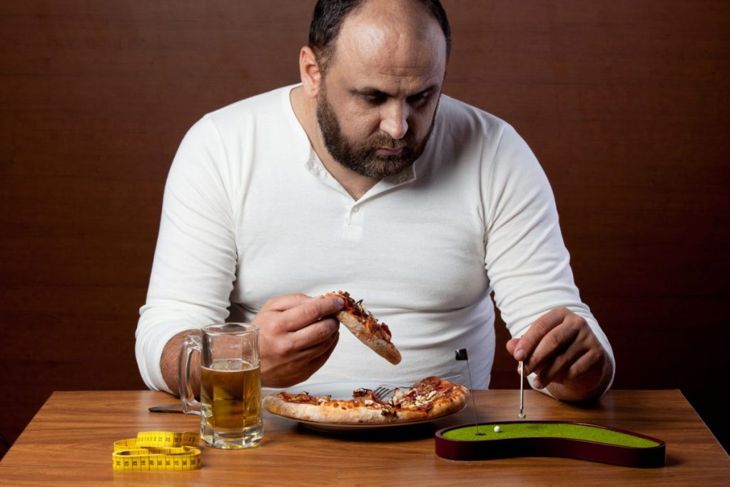Emotional eating is eating in response to positive or negative emotions rather than physical hunger. Many people use food as a reward or to celebrate, and, in moderation, this is unlikely to lead to problems. If eating becomes a primary coping mechanism in the face of stress or feeling upset, exhausted, or bored, a person risks beginning an unhealthy cycle that does not address these underlying feelings. Emotional eating may interfere with making healthy food choices and ultimately lead to weight gain.
Signs
Everyone eats for reasons other than hunger once in a while. If this happens regularly and in response to negative emotions, it may be a sign of emotional eating. Indicators can include frequently eating when not hungry or changing one’s eating habits during difficult or stressful times. Often, people develop feelings of guilt after eating under these circumstances, and this can lead to more eating. If this behavior becomes increasingly commonplace, the person may have a problem that needs to be addressed. Another sign of emotional eating is weight gain; many people with this mental health condition are overweight.
Causes and Theories
Emotional eating tends to be more common in women than men and is uncommon in children. It is a recognized psychiatric condition that experts believe often originates or is made worse by the individual, family, and cultural factors. Identifying the underlying cause helps direct management of the condition. Depression and obesity are often associated with emotional eating habits. Diets that restrict food intake can result in emotional eating and subsequent weight gain in vulnerable individuals. Some people have poor self-awareness that results in a disordered sensitivity to feelings of fullness, leading to eating when not hungry. Some of these issues are related to parenting practices beginning in childhood. Post-traumatic stress disorder (PTSD) is also linked to emotional eating. Normally, people experience reduced hunger after a stressful event, but people with PTSD may have unusually high feelings of hunger after stress and overeat in response.
Investigation
Only a healthcare professional can diagnose emotional eating, and the diagnosis requires taking time to explore lifestyle and behaviors, particularly around eating habits, and identifying triggers of excessive eating. Several questionnaires can assist in making a diagnosis; this information will help identify the most suitable treatment plan.
Relationship to Dieting
Dieting is one of the major risk factors for emotional eating. When a person is regularly under-eats, the body cannot distinguish between diet-imposed food restrictions and real food shortage. Dieting usually increases hunger and appetite. If a person who is susceptible to emotional eating is faced with these feelings and is then stressed or has a negative emotional experience, they are very likely to overeat in response. For these reasons, people who are emotional eaters usually find their diets fail.
Relationship to Depression
Feeling depressed usually results in a reduced appetite and subsequent weight loss. Some people, however, feel more hungry when depressed and will emotionally eat and gain weight. Many experts believe emotional eating is the link between depression and obesity.
Self Help: the First Steps
For some people, self-help strategies can help correct emotional eating before medical intervention. Methods include keeping a food diary to identify patterns that arise over time and identify triggers. Activities that help a person’s in distress, such as yoga or meditation, can also have a positive effect, and a good night’s sleep is vital, as cravings can intensify when tired. People who experience emotional eating should try to recognize whether they feel true, physical hunger at the time of eating; however, if PTSD is the cause, hunger may exist. Support groups for people with eating disorders may suit some individuals, and family and friends can provide a support network. Ensuring comfort foods are not easily accessible can stall emotional eating, and people can distract themselves from eating brought on by boredom by partaking in activities such as going for a walk, listening to music, or reading — anything that takes the mind off food.
Self-Help When Dieting
When trying to lose weight, people should create realistic, tasty, and interesting meal plans that include healthy foods in amounts that satisfy the appetite. Treats need not be completely restricted but limited to sensible amounts. Snacks between meals should be healthy, such as fresh fruit and vegetables. A healthy and active lifestyle will help individuals develop a positive outlook and may help reduce moments of stress and negativity.
Medical Help
If the self-help route does not provide sufficient benefits, people experiencing emotional eating should seek the care of a professional. Therapy and other treatments can provide further tools to help deal with the condition. One of the commonest approaches is cognitive behavioral therapy (CBT), which focuses on identifying and dealing with the negative and unproductive actions of overeating and replacing them with positive behaviors. If depression is contributing to emotional eating, then antidepressants may help the underlying cause.
Risks
Emotional eating can increase the risk of developing more serious eating disorders such as bulimia nervosa, which has many adverse mental and physical health consequences. As such, it is vitally important to identify emotional eating at an early stage to enable prompt and timely treatment.
Recovery
Full recovery from the effects of emotional eating can be difficult to define. When the problem involves weight gain, normalization of weight may be an early sign, though it can also signify other eating disorders. The emotional and mental issues that contribute to the condition will take longer to treat and regular and require continued vigilance.

 Home
Home Health
Health Diet & Nutrition
Diet & Nutrition Living Well
Living Well More
More




















